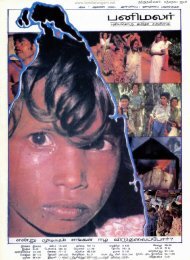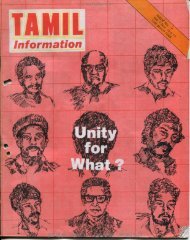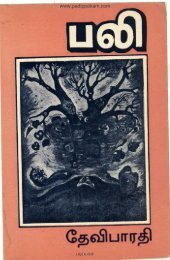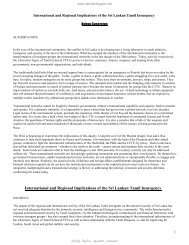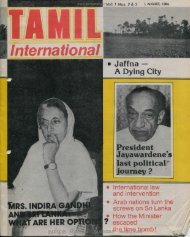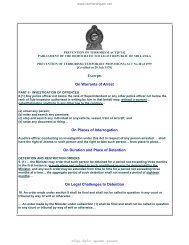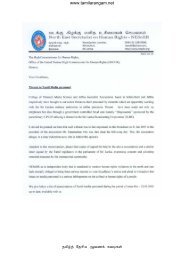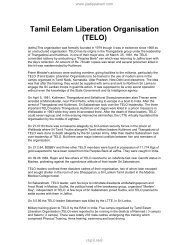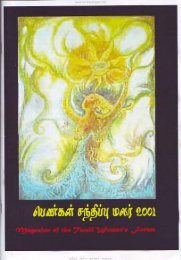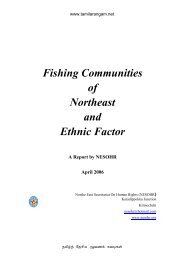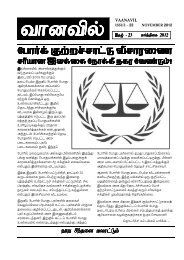Information
Information
Information
- No tags were found...
Create successful ePaper yourself
Turn your PDF publications into a flip-book with our unique Google optimized e-Paper software.
www.tamilarangam.netIndo-Sri Lanka relations:What Thondaman saidYour Excellency Shri Chattwal, YourExcellencies, Hon. Ministers, DistinguishedGuests, dear friends.I wish to express my thanks to all of youfor responding to our invitation which hadbeen extended to you at such short notice.This in a measure demonstrates the popularityof Shri. Chattwal and the appreciationfor the work he has done here.Shri Chattwal has been the High Commissionerfor India in Sri Lanka during a criticalperiod — critical in the history of the peopleof Indian origin and of the Tamil people,critical in the political history of Sri Lankaand critical in Indo-Sri Lanka relations.The historical antiquity of Indo-Sri Lankarelations, the determining influence of thegeo-political and geo-ethnic factors andthe inextricable links that exist betweenIndia and Sri Lanka need no emphasishere. The dynamics of Indo-Sri Lankarelations has operated in various ways.The people of Indian origin have a deepseated feeling that the dynamics of Indo-Sri Lanka relations has sometimes operatedto the detriment of their interests. Theirinterests had been sacrificed for the sakeof what was at certain times conceived tobe in the interests of Indo-Sri Lankarelations.The Indian origin people are descendantsof the 19th and early 20th century migrantswho came from India to Sri Lanka in thewake of the phenomenal demand for labourcreated by the plantation system. The19th century was a period of vast economicdevelopments and saw an unprecedentedgrowth in the modern system of production.Indian migrants went to settle in countriessuch as Guyana, West India, South Africa,East Africa. Mauritius, Reunion Islands,Sri Lanka, Malaysia, Fiji and other countries.The Indian Government had to formulatea clear policy about this group of peqplewho settled in other countries. This policyis exemplified in a statement made by SirGirija Shankar Bajpai during the Indo-Ceylon discussions of 1941. He said thatas a matter of principle India put forwardcertain claims on behalf of such settlersparticularly in other units of the BritishEmpire. He categorically stated that itwould not be possible for India to vary itspolicy in the case of any single country.Unfortunately in later years an exceptionwas made in the case of Sri Lanka. Bysigning the Srimavo-Shastri Pact in 1964,India adopted an approach that was uniquein respect of its overseas settlers. Todaythe long established community of Indianorigin Tamils in Sri Lanka has been tornasunder into two sections and are presentlyundergoing the trauma of this division.Every day the CWC Office is inundatedwith letters from repatriates explaining theserious difficulties undergone by them.The vast majority of repatriates — over70,000 families composing about 400,000people have not been properly settled.The CWC has sent a delegation to India tostudy the situation. We hope to take upmatters with the government of India afterthe report from this delegation is received.The CWC is considering institutional arrangementsin India to assist these people.For the remaining section of the communityin Sri Lanka who are divided into Sri Lankancitizens and "stateless", the situation ismarked with uncertainty. Even those whohave obtained Sri Lanka citizenship haveto live with a sense of insecurity. Theever deepening ethnic crisis is furtheraccentuating the situation.The denial of their legitimate rights tothe plantation Tamil people, the discriminationpracticed against them, the lack ofinfra-structural arrangements to enable theutilisation of the benefit of government'sprogrammes, the state of insecurity to whichthey are subjected to, afe all part of thetotality of the ethnic crisis and are clearlyset in the context of Indo-Sri Lanka relations.The deepening ethnic crisis saw anintensification of discrimination and thephenomenon of physical attacks. Theviolences of 1950,1977 and 1981 culminatedin the holocaust of July 1983.The July 1983 violence made both thegovernments of India and Sri Lanka realisetheir responsibility to jointly find a solution.The Indian Foreign Minister came hereand Sri Lanka sent a special envoy toIndia. I do not want to recount here thevisits made by the special envoy of thePrime Minister of India, the visit by ourPresident to India, the working out offormulas, the all Party Conference, andother developments.What is of significance is the universalrecognition that both India and Sri Lankahave to find a solution to the Sri Lankanproblem. -Under these circumstances, some ofthe statements made by both sides arerather puzzling. The Indian governmenthas described the situation in Sri Lankaas deplorable, brutal, barbaric and inhuman,and continues to say that they are in closecontact with the government of Sri Lankato find a solution. Concerned Sri Lankaauthorities talk about this being a purelySri Lankan affair, an internal problem andeven claiming that there is no ethnicproblem in Sri Lanka. In the meanwhileblood is flowing freely and destructiongoes on unabated.Prime Minister Rajiv Gandhi has spokenabout there being light at the end of thetunnel. The tunnel seems to be neverending and increasingly becoming darker.14jkpo;j; Njrpa Mtzr; Rtbfs;



